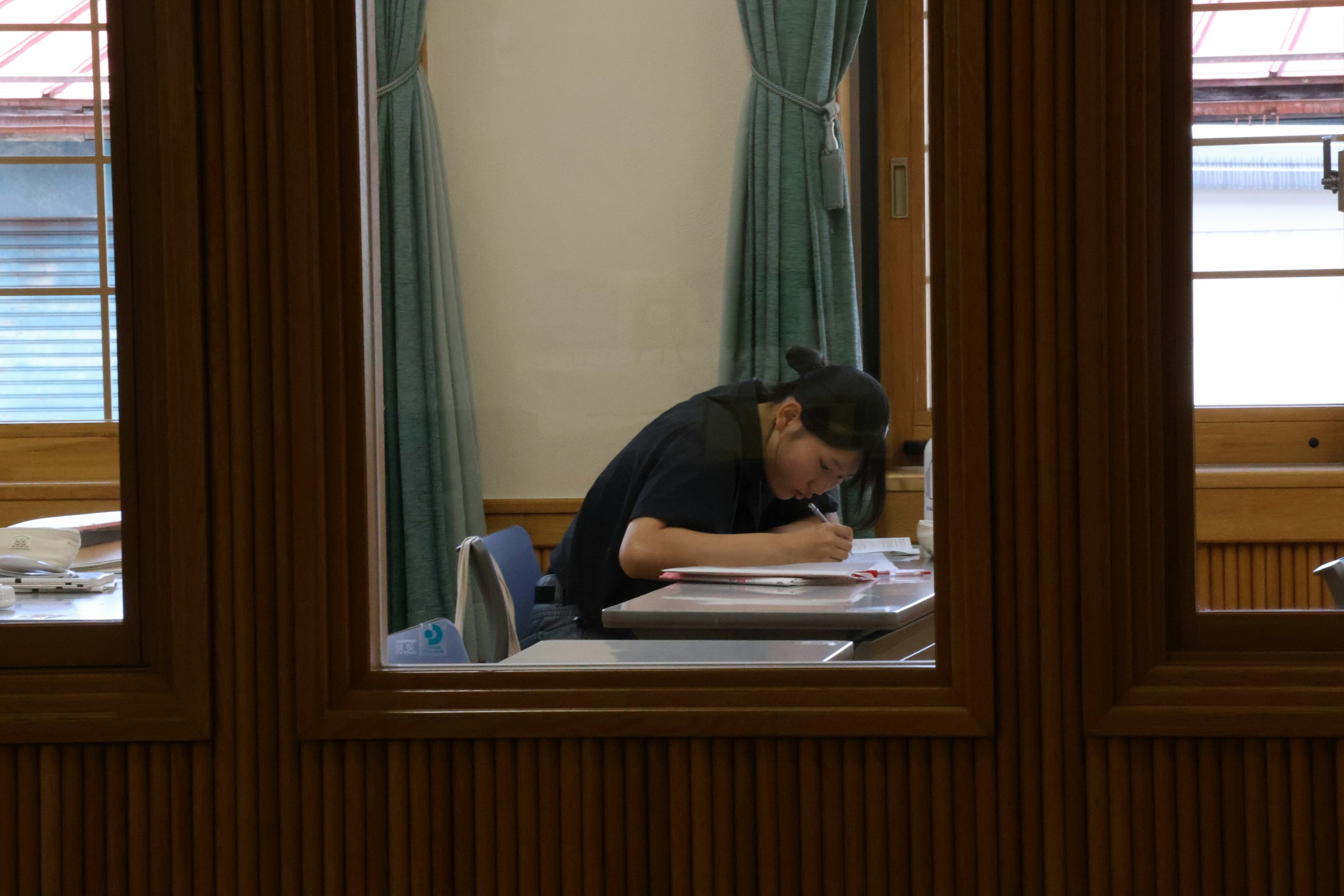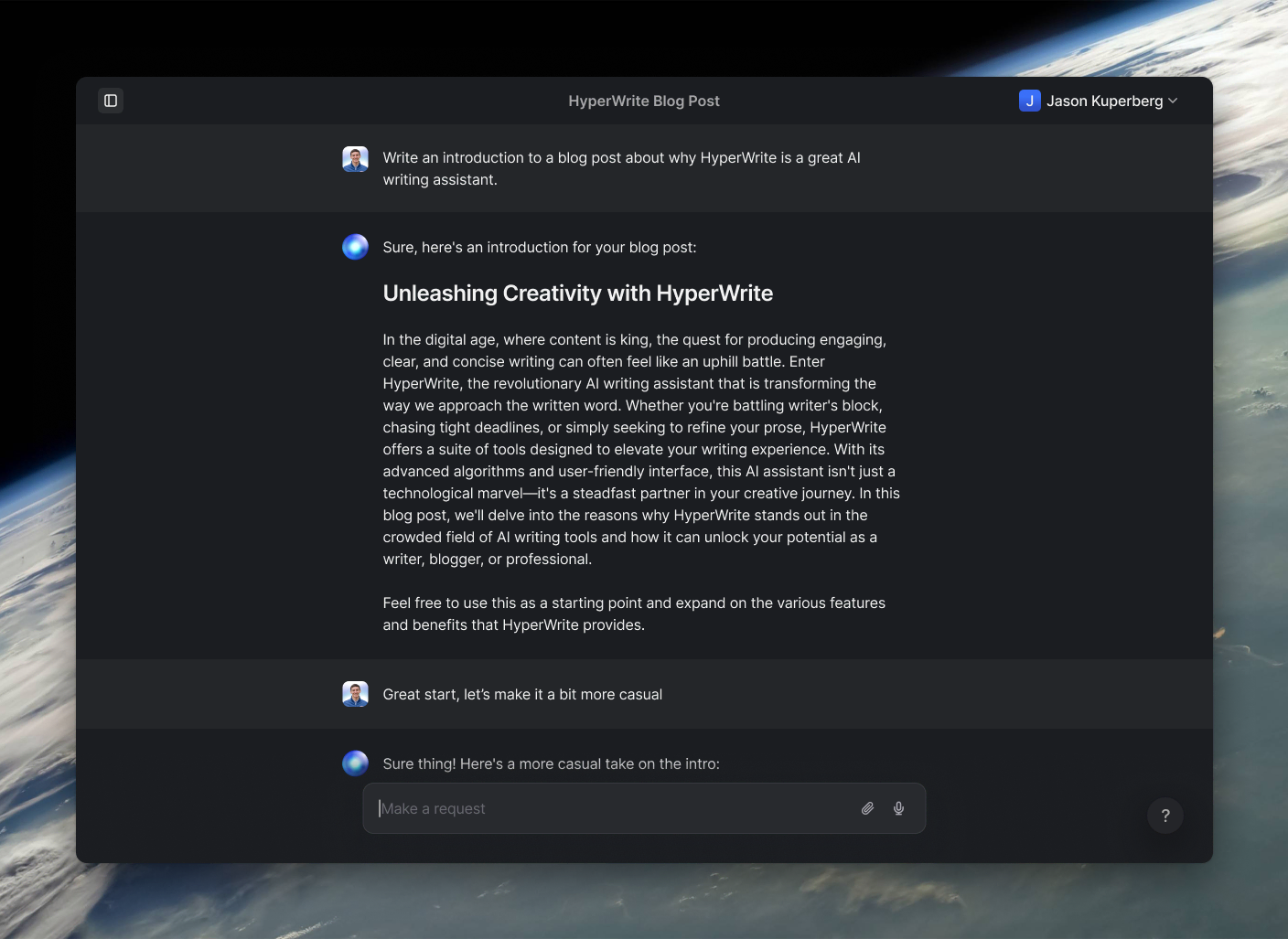.jpg)
Finals week can feel like a stack of tests, projects, and last-minute reviews that crowd out sleep and focus, leaving little time for rest and concentration. Under study tips for college, knowing how to study for finals in high school matters because smart exam prep, like a clear study plan, time management, active recall, spaced repetition, flashcards, practice tests, Pomodoro breaks, study groups, and solid notes, helps you protect grades without burning out. Want a step-by-step system that keeps you calm, confident, and well rested during exam week?
HyperWrite's AI writing assistant turns those ideas into a realistic schedule, concise review sheets, and tailored practice questions to help you ace finals with high grades while staying calm, confident, and well rested.
Summary
- Finals often concentrate outsized academic consequences into short windows, with some finals counting for up to 50% of a course grade, which makes a single exam or project disproportionately determinant of semester outcomes.
- Stress and sleep disruption are widespread during finals week, with approximately 85% of students reporting increased stress and 60% reporting sleep disturbances, which can lead to reduced attention, working memory, and mood.
- Fragmented schedules from classes, extracurricular activities, and jobs make deep review impossible, so a simple habit like setting aside one hour on Sunday to build a realistic weekly plan measurably reduces decision fatigue and clarifies priorities.
- Method choice trumps brute force when time is limited: studying in 25-minute intervals with 5-minute breaks improves retention by about 30%, and pairing active recall with spaced practice yields far higher returns than rereading.
- Procrastination is often due to scope and emotional friction rather than laziness, and breaking tasks into weekly micro-goals or starting with a five-minute commitment can convert avoidance into momentum, reducing the need for last-minute cramming.
- Small environmental and routine fixes scale under pressure: keep one dedicated study zone, take intentional breaks of 5 to 15 minutes (or up to 45 minutes for longer rests), and pack two alarms plus exam essentials the night before to protect cognitive energy.
- This is where HyperWrite's AI writing assistant comes in; it converts raw notes into concise review sheets and tailored practice questions, allowing students to shift setup time from hours to minutes and focus more on active recall.
Why is Finals Week So Stressful?

Finals week feels like pressure because several forces converge at once: heavy weighting on a few assessments, compressed time to study, and simple biological strain from lost sleep and mounting anxiety. Those factors combine so that your performance on a single week can significantly impact a semester’s outcome, and that concentrated risk is what creates the urgency and dread.
Why Does Every Grade Feel Like A Cliff?
Finals often matter more than any single test earlier in the term. Depending on the class, a final exam or project can count for up to 50 percent of your grade, so one bad day can erase weeks of steady work. Over months, you’ve already paid a cognitive tax from regular quizzes, papers, presentations, and nightly homework, which accumulates weariness.
You’re mentally taxed and unaffectionate toward more grind. When students tell me they are “ready to be DONE,” treat that as precise information: motivation is low because the system has demanded sustained output for months with little time to recover.
What Breaks First: Time, Or Sleep?
Time squeezes choices. A packed exam schedule forces you to triage topics, skipping depth for breadth. That triage works until sleep collapses. According to KSVT, approximately 85% of students report increased stress levels during finals week, indicating that the stress spike is nearly universal and that this stress then negatively impacts study quality.
In the same dataset, KSVT found that 60% of students experience sleep disturbances during finals week, which is significant because sleep is essential for the brain to consolidate learning; without it, hours of study become shallow and brittle, leading to poor recall.
How Do Extracurricular Activities and Scheduling Deepen the Problem?
This is a timing and resource problem. Students who still have sports meets, band concerts, or part-time jobs during finals lose discrete blocks of study and the chance to rest. Add the psychological pressure of an upcoming break, and focus fractures. You want to finish fast to enjoy the holiday, but accelerating study increases mistakes.
The failure mode is predictable:
Cram in a limited, noisy time, then underperform on an exam that rewards integrated understanding rather than short-term memorization.
Beyond Busywork: Using AI to Optimize Study Efficiency
Most students manage studying by collecting notes, making flashcards, and pulling late-night sessions because those methods are familiar and low-friction. That approach works well early on, but when material multiplies and you lack time, busywork becomes overwhelming: you spend more time organizing notes than actually testing yourself, context gets scattered across multiple apps, and critical references are difficult to find.
Solutions like AI writing assistants help by turning long chapters into concise summaries, generating practice questions from your notes, and producing citation-ready references, which compresses the administrative part of studying and preserves the cognitive energy you need for deep practice.
What are the Emotional and Physical Effects You Should Expect?
Anxiety shows up as a rapid heartbeat, blanking during an exam, or a creeping sense that you forgot everything. Burnout appears differently; it is not dramatic, but rather a steady plateau of fatigue, where even simple tasks feel overwhelming.
On the physical side, disrupted sleep causes slower reaction times and weaker short-term memory; on the emotional side, a fear of a grade drop can lead to avoidance, procrastination, or perfectionism, all of which waste time.
Think of Your Brain Like a Phone Battery
You can run the apps hard all day, but if you never plug in, performance throttles and errors rise.
That reality is harsh, but it points to a practical truth:
- The pressure comes from identifiable
- Fixable bottlenecks, such as the weight of assessments, scheduling conflicts, and reduced sleep
- The emotional toll of high-stakes situations is not due to some mysterious personal failing.
Something in this pressure pattern changes everything about how you should study next.
Related Reading
- When Is the Best Time to Study for a Test
- What Is the Hardest Thing to Study in College
- Can AI Solve Math Problems
- How to Study in Med School
- Types of Study Methods
- How Long Should You Study for a Test
- How to Study for a Math Test
- Study Tips for High School
- Study Tips for Middle School
- Study Strategies for High School Students
How to Study for Finals in High School

Start by treating studying as a system, not a sprint:
- Balance sleep
- Movement
- Focused practice
- Clear schedule
So each hour you spend produces measurable learning instead of friction and anxiety. Use short, deliberate study blocks, guard a dedicated workspace, remove distracting devices, and leverage tools that convert messy notes into practice questions and bite-sized summaries.
Why Should I Keep Daily Self-Care During Finals?
When students run out of energy, motivation wanes, and even small mistakes seem huge. This pattern appears across dorms and commuter campuses:
- Poor sleep
- Skipped meals
- No fresh air, shrink focus
- Make review sessions ineffective
Prioritize consistent bedtimes, short walks outside, and a simple evening routine that blocks social plans when you need sleep. Move your body with short workouts or stretches to reset your attention, and keep water and a quick, healthy snack on hand so your brain does not run on empty.
How Do I Make a Planner That Actually Works?
Set aside one hour on Sunday to create a practical weekly plan, listing class priorities, study sessions, and any other tasks you need to complete. Students who make a study schedule tend to perform better on exams, according to a study by the University of Cincinnati.
Make the schedule realistic:
- Block single-subject chunks
- Add buffer time for unexpected tasks
- Mark short social windows so you do not burn out
When you map time visually, decision fatigue drops, and you stop wasting minutes deciding what to do next.
How Should I Structure My Study Time to Get the Biggest Return?
Rely on high-leverage formats, not more extended hours. Use active recall, practice testing, and targeted note rewriting. Students who study in 25-minute intervals with 5-minute breaks experience a 30% improvement in retention, according to the Educational Psychology Journal.
Try these routines: convert lecture notes into one-page summaries, then turn those summaries into practice questions you answer without looking. Rewriting messy class notes into clearer versions forces you to process the information, and quizzing yourself reveals gaps faster than rereading.
What Do I Do When Procrastination Wins?
Procrastination is not moral failure; it is a symptom of unclear scope and emotional friction. The familiar approach is to wait until pressure peaks, then cram. That works in the short term, but it creates brittle knowledge and skyrockets stress.
Break large tasks into weekly micro-goals, assign each goal a single study block, and treat early small tests as deliberate practice. If you notice avoidance, identify the trigger, break down the task into manageable chunks, and then use momentum to extend the session.
Where Should I Study To Actually Focus?
Create a dedicated study zone and use it exclusively for work. A desk, good lighting, a comfortable chair, and the necessary supplies cut the decision-making cost of each session.
This setup conditions your brain to switch into study mode when you sit down. If you cannot claim a room, use a specific corner or library table and add a physical signal, like putting on one pair of headphones, to mark the start of work.
How Do I Remove Device Distractions Without Losing Essentials?
Even a silent phone within reach eats attention. If you need your phone for alarms or reference, put it across the room or use a different device for timers.
Turn off nonessential notifications and try a focus app for set sessions. The hard truth is, presence matters: many students think self-control will be enough, and it rarely is. Build environmental barriers so willpower does not have to carry everything.
What if One Study Method Stops Working?
You should expect different approaches to fit different classes. Visual subjects respond well to diagrams and color-coded notes.
Language and history need spaced recall and retelling. Math requires problem sets and teaching the steps aloud. Track method performance for two weeks: note how often you recall correctly on a timed quiz, then keep what works and discard the rest. Flexibility beats dogma.
When is a Study Group Helpful, and How Do We Run One?
Study groups are most effective when they have a clear structure. Start each meeting with a clear agenda, assign short teaching slots where each person explains one concept, and end with a 10-minute quiz that everyone takes separately. This keeps the group accountable, turns passive review into active recall, and quickly surfaces misunderstandings.
How Long Should Breaks Be, and What Should I Do During Them?
Take intentional breaks between focused sessions to reset the brain. A 5 to 15-minute break can include breathing exercises, a quick walk, or stretching.
Longer breaks, up to 45 minutes, are good if you need to cook or nap, but put a hard stop so the break does not extend into avoidance. The benefit of breaks is that they make your focused minutes count, not just increase total time awake.
How Do I Keep Goals Clear When Everything Feels Urgent?
Create a grade-based priority chart: list classes, current grades, and target grades, then allocate study weight accordingly. If math will drop from a B to a C without intervention, assign it more time than a history class, where a B is already secure. Keep your goals visible in your planner and review them weekly so that your energy is spent where it has the most impact on outcomes.
How Can Technology Actually Save Time Instead Of Stealing It?
Most students handle study material by retyping or reformatting notes because it feels like progress. That familiar approach is comforting, but it consumes hours that could be spent on practice.
The hidden cost emerges when notes accumulate and you spend time organizing instead of learning. Solutions like AI writing assistant convert raw notes into summaries, practice questions, and ELI5 explanations, compressing setup from hours to minutes and freeing time for active recall.
What Should I Pack And Check Before Exam Day?
The night before, lay out your essentials, confirm the venue and time, and set two alarms. Pack a small kit with pens, a calculator with fresh batteries if needed, ID, water, and a compact snack. This reduces morning chaos and preserves your cognitive energy for the test itself.
Pattern-Based Insight From Working With Students
Across semesters, the consistent pattern is clear:
- Students who protect sleep
- Schedule study time
- Use practice testing to become more confident and reduce careless errors.
When those elements are missing, study sessions feel scattered and motivation collapses. Tactics like short, repeatable routines and removing device friction scale well under pressure because they reduce decision load and create reliable habits.
Practical Checklist To Start This Afternoon
- Block one study hour, set a 25-minute focus timer, then test yourself for five minutes.
- Rewrite a messy page of notes into a one-paragraph summary.
- Move for ten minutes, then hydrate and return to a fresh 25-minute block.
- Schedule two 30-minute review sessions for the weeks ahead next Sunday.
That solution sounds simple until you try to make it habitual, and that tension is where most students get stuck.
But the real reason this keeps happening goes deeper than most people realize.
Related Reading
- How Many Hours Do College Students Study per Week
- Good Study Habits for College
- Study Habits for High School
- How to Study the Night Before an Exam
- Different Study Techniques
- How to Study for a Final Exam
- How to Create a Study Schedule
- Scientifically Proven Study Methods
Try our AI Writing Assistant to Write Natural-sounding Content
When students bring me generic, citation-light drafts, the pattern is evident: you spend more time rescuing tone and tracking sources than actually thinking, and that drains momentum when every minute counts. We know you worry about AI that sounds lazy or uncited, and that hesitation is common among students who end up rewriting generated drafts instead of focusing on their studies.
Consider HyperWrite, Freelancer’s Hub, 85% of users reported improved content quality with the AI Writing Assistant, and the AI Writing Assistant reduced writing time by 40% for 70% of users, so you can reclaim hours and hand in work that reads like you.
Related Reading
- Best Study Methods
- Best Way to Study for a Test
- Best Light Color for Studying
- Best AI Websites for Students
- Best AI for Exams
- AI Activities for High School Students
- Best AI to Solve Math Problems
- Best Study Tools for College Students
- Best Study Apps for College Students

Powerful writing in seconds
Improve your existing writing or create high-quality content in seconds. From catchy headlines to persuasive emails, our tools are tailored to your unique needs.

